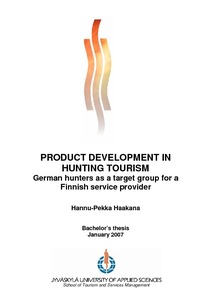Product development in hunting tourism: German hunters as a target group for a Finnish service provider
Haakana, Hannu-Pekka (2007)
Haakana, Hannu-Pekka
Jyväskylän ammattikorkeakoulu JAMK University of Applied Sciences
2007
Julkaisu on tekijänoikeussäännösten alainen. Teosta voi lukea ja tulostaa henkilökohtaista käyttöä varten. Käyttö kaupallisiin tarkoituksiin on kielletty.
Julkaisun pysyvä osoite on
https://urn.fi/URN:NBN:fi:jamk-420
https://urn.fi/URN:NBN:fi:jamk-420
Tiivistelmä
Tämän opinnäytetyön aiheena oli metsästysmatkailu, joka on vähemmän tutkittu matkailun osaalue. Sitä ei usein edes tunnisteta osaksi matkailualaa. Työn pääasiallinen tavoite oli kehittää uusia tuotteita suomalaiselle matkailuyrittäjälle, joka tarjoaa metsästysmatkailupalveluita. Hänen tavoitteenaan taas oli saada uusia ulkomaalaisia metsästäjiä asiakkaiksi. Koska saksalaiset metsästäjät ovat potentiaalisin metsästysmatkailun asiakasryhmä, heidätvalittiin kohderyhmäksi. Tietoperustaksi kerättiin tietoa useista eri lähteistä. Ensin määriteltiin metsästysmatkailu matkailun viitekehyksessä ja sen tunnusomaisia piirteitä verrattiin muihin matkailun osa-alueisiin. Seuraavaksi tuotekehitysprosessin eri vaiheet käytiin läpi ja kohderyhmän profiili luotiin hakemalla tietoja useista eri tutkimuksista ja kyselyistä. Myös palvelun tarjoajan palvelut, tuotteet ja resurssit arvioitiin. Lopuksi vielä tutkittiin matkailua palvelutuotteena. Teorian soveltamiseksi käytäntöön tuotekehitysprosessi kuvattiin käyttämällä kerättyä tietoa kohderyhmästä ja palvelun tarjoajasta. Tällä tavoin oli mahdollista kehittää uusia tuotteita. Tärkeimmiksi asioiksi nousivat metsästykseneettiset asiat ja kestävän käytön periaatteet riistanhoidossa. Lisäksi paikallista metsästyskulttuuria tulisi korostaa saksalaisille metsästäjille. Pohdinnassakävi ilmi, että kun tuotekehitys perustuu asiakkaan tarpeisiin, tuote tulee todennäköisemmin menestymään. Kyseessä olevalla kohderyhmällä on mahdollisuuksia mutta vaatii myös erikoishuomiota. Suomella on myös runsaasti mahdollisuuksia metsästysmatkailukohteena. Maamme puhdasta luontoa ja erikoisia riistakantoja tulisipitää tärkeimpänä resurssina ja myyntivalttina etenkin tulevaisuudessa. The topic of this thesis is hunting tourism, one of the less studied forms of tourism. In fact, often it is not even officially recognised aspart of the tourism business. The main purpose of this thesis was to develop new products for a Finnish service provider offering hunting tourism services. Theobjective of the entrepreneur was to reach foreign customers in the future. Since German hunters are one of the most potential hunting tourist groups in Europe, they were chosen to be the target group. The theoretical framework was createdby collecting information from different researches and literature. First, the position of hunting tourism was defined and its characteristics were compared with other forms of tourism linked with nature based tourism. Second, the product development process was studied and information of the target group was gatheredfrom surveys concerning hunting tourism. Also the service provider's existing services, products, and resources were evaluated. Finally, the specific features of tourism as a service product were researched. To implement the theory in practise, the product development process was described and followed by using the information of the target group and the service provider. Through this process it was possible to create suggestions for these particular products. Moreover, new product examples were created based on the suggestions. The most important issues seem to be hunting ethics and sustainable use of natural resources. Furthermore, the service provider should emphasise the local hunting culture. The conclusive discussion points out that through product development based on the customer's needs, the finished product is likely to be successful. The target group has potential but does also have specific requirements. Finland has plenty of potential as a hunting destination, and the clean nature and unique game populations should be considered as a competitive advantage.
